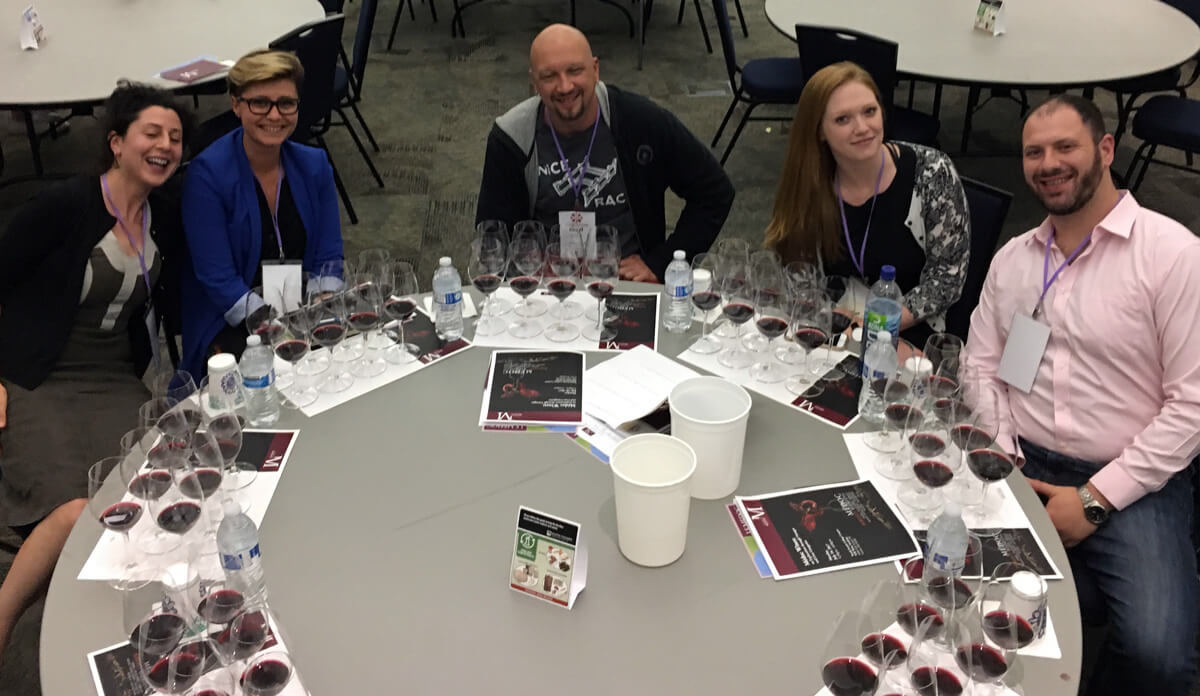Taking your wine education to the next level? Know where to start. Here’s a breakdown of wine sommelier levels and what they really mean.

Wine Sommelier Levels
- Beginner Level: Work in a tasting room, impress your friends, plan a trip, and feel confident about your knowledge of wine.
- Certified Level: Feel confident working in a wine bar, restaurant, or a wine store. Teach your friends and associates, and organize tastings.
- Industry Experienced Pro: You’ve worked in wine for a while and you know how things work. You can command a salary as a sommelier. You can run a wine list, open a restaurant, and educate students about wine.
- Mastery: A level that takes up to 10,000 hours of deliberate practice. You teach pros and push the industry forward.
There are several options from which to choose, so let’s work through the choices and determine which one might be best for you.
In this article, we’ll focus on two popular wine sommelier training programs: Wine & Spirit Education Trust (WSET) and Court of Master Sommeliers (CMS). At the bottom, you’ll also see details on the other major programs.

CMS vs WSET: What’s the difference?
These two programs seemingly offer the same education in wine (not to mention sake, spirits, and beer), but their differences help to define them. A few to note:
- At its core, Court of Masters is “service” oriented. This path is great for wine professionals in the service industry working as a sommelier.
- The WSET program is “communications” oriented. The program is great for sales representatives, other wine trade, and educators.
- CMS plays to the strengths of the independent learner, requiring self study and self education, followed by a 1-3 day course and exam.
- WSET is great for learners who like the structure of a formal class with time in between to absorb and reflect.
- CMS requires students to pass each course before moving to the next. WSET is a multi-level program that doesn’t require prerequisites.
Disclaimer
Neither program offers more or less than the other. It’s all about what you want to get out of your certification (including the programs listed at the bottom of this article!)
How long does it take to become a certified sommelier?
It depends on you! That being said, expect most certification programs to take one year or more.
Why get a wine certification?
In short, certifications can help you better achieve your goals within the beverage industry. They’re not the only way, but they can help to distinguish you from your competition. They also help to expand your wine knowledge, refine your craft, and open doors for your career.

Court of Masters Sommeliers (CMS)
Level 1: Introductory Course
Getting Started
Cost: $700* + (pricing based on 2020 figures)
Time to Prepare: Think of this level as an introduction: an umbrella of information, including common terminology, wine regions, and grape varieties, not to mention spirits, beer, and sake. If you get 60%+ of the questions correct, you pass!
A minimum of three years in the beverage industry is recommended. The actual course in CMS is a fast paced, two-day tasting and theory lecture followed by a multiple choice exam. This first level includes a brief introduction to the tasting method, so if you’re looking to hone your skills, we’ve got a terrific article that should get you going.
Level 2: Certified Sommelier Examination
A Depth of Information
Cost: $600 +
Time to Prepare: The CMS recommends one year of preparation between taking the Introductory Course and attempting Certification.
Now that you’ve gotten your toes wet, you might be looking for something a little more advanced. Where Level 1 exams are focused on a breadth of information, Level 2 explores things more deeply, building on your knowledge from Level 1. You’ll need to prepare for this exam on your own!
The Certified Sommelier exam is a one day examination that puts theory, tasting, and service skills to the test. To pass this level, you must complete all three of the following exams with at least 60% correct answers on each section, simultaneously:
- Tasting: You are given 30 minutes to blind taste four wines (two red, two white).
- 45-Question Theory Exam: This will include general questions on wine and being a sommelier.
- Service: Level 2 is the first exam with a service section. CMS recommends spending some time in the industry before tackling this exam. For those new to wine service and table-side sales, CMS offers a wealth of resources.
“Don’t stop. It’s okay to take a couple of weeks off, but if you’re passionate, you need to keep going.”
-Aaron Patrick, Master Sommelier
Level 3: Advanced Sommelier
Putting Your Knowledge & Skills to the Test
Cost: $1,200 +
Time to Prepare: Again, the CMS recommends a year between passing the Certified Sommelier and the Advanced Sommelier programs. Additionally, they do require two years of industry experience before you’re eligible to take the course.
Here’s where mentorship and tasting groups really start to make a difference. Find a mentor that knows more than you, and let them teach you their tips and tricks. This exam is a real commitment, and requires a 60% pass rate on each of the following sections:
- Theory: A written exam concerning knowledge of wine, beverage, and sommelier practices.
- Tasting: A face-to-face verbal testing of palate skills.
- Service: A practical demonstration of service abilities.
Level 4: Master Sommelier
Think Like A Master
Cost: $1,800 +
Time to Prepare: Three + years from the completion of Level 3 certification.
Working to become a Master Sommelier is glamorous and so completely nerve-racking. The exam itself, plus the time and personal commitment make this no easy task. Here’s what it takes:
- Oral Theory Exam: A 50-minute verbal exam about the responsibilities of a sommelier.
- Tasting Exam (6 wines): Describe and identify six different types of wine successfully.
- Wine Service Exam: Prepare and present a proper wine service, including glassware, decanting, and answering customer questions.
Time to hit the books! The pass rate of the theory portion of this exam is approximately 10%. You can do it! Afterwards, grab yourself a glass of Champagne and pat yourself on the back. The full CMS test details are here.
“I stepped back. I trusted myself. I trusted my abilities. At this level, one knows how to taste wine. In an exam setting, it’s just a matter of keeping mentally tough and relaxed, and then describing wine and showing mastery. It’s as simple as that. It only took me 16 years to figure that out.”
-Scott Tyree, Master Sommelier

Wine & Spirit Education Trust (WSET)
Level 1: WSET Level 1 Award in Wines
The Beginner’s First Step
Cost: $200 – $300 +
Time to Prepare: Six hours of study time
Great for individuals interested in beginning a journey with wine, WSET Level 1 offers a casual and approachable environment accompanied by a workbook. The one day class lecture is followed by a multiple choice exam. Topics span over principle wine topics and include common grape varieties, types and styles of wine, and food and wine pairing.
Level 2: WSET Level 2 Award in Wines
Take A Step Into The Deep Side of The Pool
Cost: $800 +/-
Time to Prepare: 28 + hours of study time
Here’s where CMS and WSET start to really show their differences. Unlike CMS Level 2, this exam consists only of multiple choice questions and does not require students to take a tasting or service examination. Series classes are offered and span the course of a few weeks. Main focuses for this exam are on tasting and describing wine, grape varieties, regions, and wine making. If you feel comfortable, skip the line! Wine & Spirit Education Trust, Level 2 is for a beginner to intermediate levels.
Level 3: WSET Level 3 Award in Wines
Things Are Getting Serious
Cost: $1,300 – $1,800
Time to Prepare: 84 + hours of study time
This advanced level class is a step up from Level 2. Much of the information for this exam is centered on the Level 3 Workbook, which covers in-depth wine regions, wine and food pairings, and principle wine types. Beyond factual recall, the emphasis here is on being able to apply your understanding of grapes, regions, climate and wine production to explain why a wine tastes the way it does.
The Exam includes:
- Tasting Portion: A blind tasting of two different wines.
- Theory: A written exam, including multiple choice and short answer questions.
Curious how to achieve this level? Find others that love studying wine as much as you do! Peer study and tasting groups are a great option.
Level 4: WSET Level 4 Diploma In Wines
Hang on for the Ride
Cost: Varies Based on Provider (online classes available)
Time to Prepare: 500 + hours of study time
The pinnacle of WSET, here’s where you should kick your studying into high gear. The WSET Level 4 Diploma consists of six parts (yes, 6) that can take anywhere from 18 months to three years to complete.
Topics of study include everything from the anatomy of grape vines to wine business and fortified wines. The exam is concluded by a research assignment along with theory and tasting. Unlike the other levels within WSET, candidates for Level 4 must pass WSET Level 3 before enrolling. The exams cover a number of different topics, including:
- Wine Production
- Wine Business
- Wines of The World
- Sparking Wines
- Fortified Wines
- A 3,000 word independent research assignment
Check out the full details for each exam here.
Other Wine Sommelier Options
Institute of Masters of Wine (IMW)
IMW is a rigorous option for wine professionals looking to expand their line of work outside of the restaurant. Geared towards educators and wine directors, think of this program as a “Masters Degree” in wine. To apply for this program, you must already have passed a wine certificate or Bachelor’s program of study in wine.
The International Sommelier Guild (ISG)
The ISG offers an introductory program with a broad curriculum and comprehensive workbook – great for students looking to set a foundation for their wine knowledge.
Society of Wine Educators
The Society of Wine Educators is an excellent resource for individuals in sales, education, and wine consulting. Certifications range from a Hospitality Specialist to a Certified Spirits Educator. Cool Stuff! The full range of certifications include:
- Hospitality/Beverage Specialist (HBSC)
- Certified Specialist of Wine (CSW)
- Certified Wine Educator
- Certified Specialist of Spirits
- Certified Spirits Educator
Wine Scholar Guild
The WSG specializes in certifications dedicated to specific wine producing countries and regions, including:
- French Wine Scholar – including specialty programs for Bordeaux, Bourgogne, Alsace, Champagne, Provence, Rhône, and Loire Valley.
- Italian Wine Scholar
- Spanish Wine Scholar

Caught the bug? You’re not alone. Completing any of these programs requires dedication, time, and commitment. Good thing to note though: it CAN be done. In the meantime, find a mentor and grow with others who are passionate about wine – there are plenty of us!
Interested in learning more about jobs and salaries in the wine industry? Take a look at this collection of wine career options.